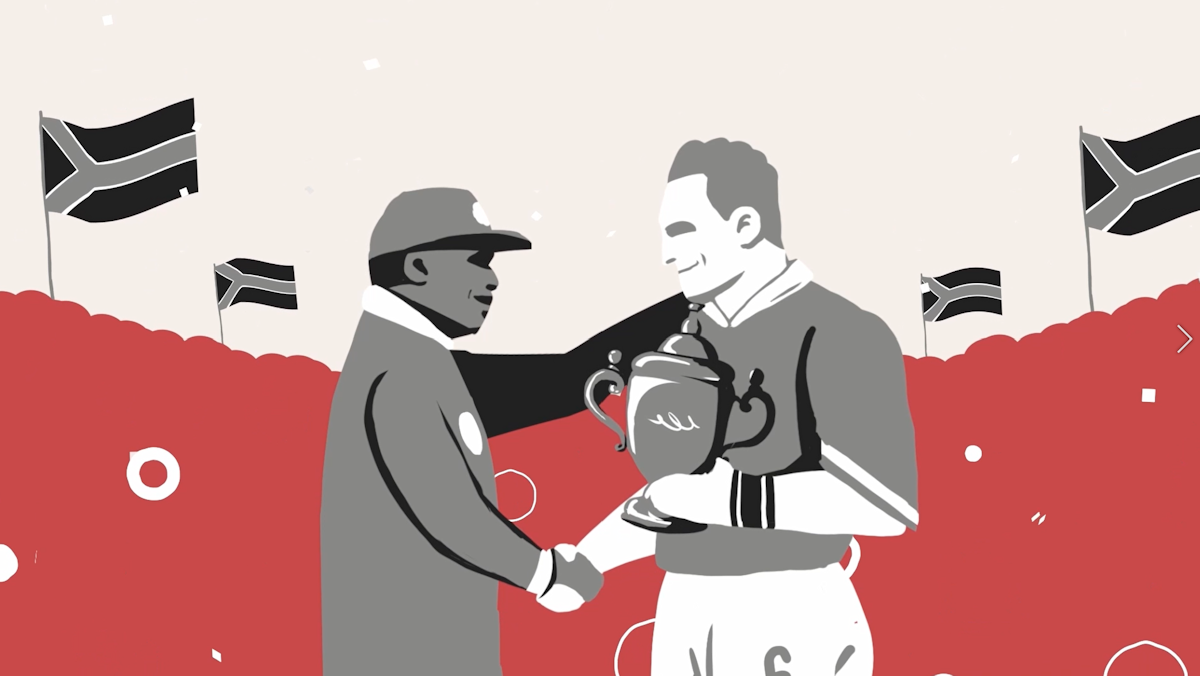Menu
Nelson Mandela was a hero whose tremendous influence led him to become South Africa's first Black president at the overthrow of apartheid. As president, Mandela sought to unify the divided identities of his country to bring his people together.
The year after Mandela’s election, South Africa hosted the Rugby World Cup. During the apartheid era, South Africa had been banned from competition, so this was a symbolic event. But Mandela recognized that it could be more meaningful still. The South African team, the Springboks, were beloved by White South Africans and widely despised by the Black population.
So when the Springboks competed for—and eventually won—the Rugby World Cup on their home turf, Mandela seized the moment. In a gesture immortalized in the film Invictus, he stepped out to the podium not just as president of the country but also as a fan—wearing the distinctive green Springbok cap and jersey. To Black and White South Africans alike, Mandela’s action was a simple but profound statement: We are one team and we are one country. In this moment, Mandela was able to co-opt a symbol of colonial oppression and use it to bring his country a bit closer together.

Social psychologists Alex Haslam and Steve Reicher have called leaders ‘entrepreneurs of identity’. Leaders are members of groups who help us define who we are, often by telling stories and using symbols much as Nelson Mandela did.
One of the hottest concepts in the leadership literature over the last 20+ years has been the idea of transformational leadership. When researchers looked into what is being assessed, they noted that there are two components to transformational leadership.
One aspect has to do with how well leaders relate to their followers as individuals — how much, for instance, a leader cares about you and your professional development. But another crucial part of it reflects how well leaders manage and mobilize groups, attuned to the well-being not just of every individual but of the community as a whole.
In complex organizations, many senior leaders are also leaders of leaders who must help the people who work for them be better at supporting and building their own groups’ identities. Effective leaders operate in group mode all of the time, which is reflected in their behavior and even the language that they use.
We and us, not I and me
How leaders engage followers with language contributes to their success. In a startling example of this, researchers analyzed a century of speeches given by politicians aiming to become the Australian prime minister. They found that the victors in these elections were more likely than the losers to use collective pronouns like "we" and "us" rather than individual pronouns like "I" and "me".
In a more recent study of annual reports written by CEOs of large German companies, researchers found that every extra collective pronoun was associated with a staggering additional 820,000 Euro in their organization's net profits.
Leaders can use symbols and language to crystallize a shared sense of identity, but truly iconic leaders like Nelson Mandela understand that much more is necessary to mobilize a group of followers around a shared sense of purpose for the long term. They create the conditions and institutions (like, in South Africa, the Truth and Reconciliation Commission) that are necessary to rally people together in support of common goals.
Leveraging a sense of national identity
Leaders who can authentically rally their people around a shared identity have a hugely powerful tool at their disposal. We observed evidence for the power of national identities in the pandemic when we teamed up with about 250 other researchers from around the world to collect data in 67 countries. We found that in nations where people had a stronger sense of national identity, people were more willing to rally in response to the pandemic and engage in the positive behaviors needed to stop the spread of COVID-19. We suggest that a sense of national identity was a tool that the leaders in those societies could draw upon to rally their people in a coordinated way.
This research gives us three clear lessons about effective leadership:
If you aspire to change and improve a group, it’s not enough to simply think of yourself as managing a bunch of individuals. Effective leaders work hard to create a collective sense of purpose — excitement about who we are and where we are going.
Leaders who genuinely think of themselves in terms of the group are more likely to use language that is collective in nature — and this language is often associated with success, in organizations and even at the national level.
But language isn’t everything. Effective leaders must authentically embody the identities of their groups and create the conditions and structures necessary to turn “our vision” for the future into “our reality”.
With support from Templeton World Charity Foundation, psychologists Dominic Packer from Lehigh University and Jay Van Bavel from New York University have produced a multi-part video series, diving into key concepts from their book The Power of Us. The goal of the project and the book is to help people harness their shared identities to improve performance, increase cooperation, and promote social harmony.